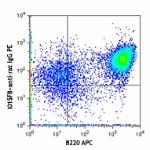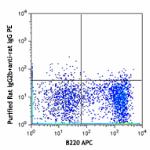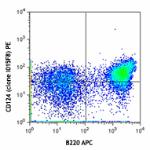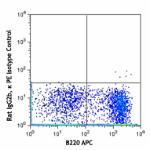- Clone
- I015F8 (See other available formats)
- Regulatory Status
- RUO
- Other Names
- IL-4R
- Isotype
- Rat IgG2b, κ
- Barcode Sequence
- GAACCGTAGTATAAC
| Cat # | Size | Price | Quantity Check Availability | ||
|---|---|---|---|---|---|
| 144815 | 10 µg | $369.00 | |||
CD124, a subunit of IL-4R, is a 140 kD transmembrane glycoprotein. It associates with either the common γ-chain (CD132) to form the type I IL-4R complex, which specifically binds IL-4, or with IL-13Ra1 to form the type II IL-4R heterodimeric complex, which binds and transduces signals from either IL-4 or IL-13. A truncated form of IL-4Rα exists in soluble form in biological fluids. CD124 is expressed on mouse late precursors and mature B cells, T cells, monocytes, and has low expression on granulocytes. In B cells, CD124 can bind IL-4 and IL-13 and regulate IgE antibody production. In T cells, the type I IL-4R (IL-4R/gC) is mostly responsible for Th2 cell expansion by mediating IL-4-dependent activation of the transcription factors in hematopoietic cells. The type II IL-4R (IL-4R/IL-13Ra1) is the main route for nonhematopoietic cell responses to IL-4 or IL-13.
Product Details
- Verified Reactivity
- Mouse
- Antibody Type
- Monoclonal
- Host Species
- Rat
- Immunogen
- Recombinant Mouse IL4Rα encoding the extracellular domain (amino acid residues 26 - 233) was fused to the carboxy-terminal Fc region of human IgG1 via a linker peptide.
- Formulation
- Phosphate-buffered solution, pH 7.2, containing 0.09% sodium azide and EDTA
- Preparation
- The antibody was purified by chromatography and conjugated with TotalSeq™-B oligomer under optimal conditions.
- Concentration
- 0.5 mg/mL
- Storage & Handling
- The antibody solution should be stored undiluted between 2°C and 8°C. Do not freeze.
- Application
-
PG - Quality tested
- Recommended Usage
-
Each lot of this antibody is quality control tested by immunofluorescent staining with flow cytometric analysis and the oligomer sequence is confirmed by sequencing. TotalSeq™-B antibodies are compatible with 10x Genomics Single Cell Gene Expression Solutions.
To maximize performance, it is strongly recommended that the reagent be titrated for each application, and that you centrifuge the antibody dilution before adding to the cells at 14,000xg at 2 - 8°C for 10 minutes. Carefully pipette out the liquid avoiding the bottom of the tube and add to the cell suspension. For Proteogenomics analysis, the suggested starting amount of this reagent for titration is ≤ 1.0 µg per million cells in 100 µL volume. Refer to the corresponding TotalSeq™ protocol for specific staining instructions.
Buyer is solely responsible for determining whether Buyer has all intellectual property rights that are necessary for Buyer's intended uses of the BioLegend TotalSeq™ products. For example, for any technology platform Buyer uses with TotalSeq™, it is Buyer's sole responsibility to determine whether it has all necessary third party intellectual property rights to use that platform and TotalSeq™ with that platform. - Additional Product Notes
-
TotalSeq™ reagents are designed to profile protein levels at a single cell level following an optimized protocol similar to the CITE-seq workflow. A compatible single cell device (e.g. 10x Genomics Chromium System and Reagents) and sequencer (e.g. Illumina analyzers) are required. Please contact technical support for more information, or visit biolegend.com/totalseq.
The barcode flanking sequences are GTGACTGGAGTTCAGACGTGTGCTCTTCCGATCTNNNNNNNNNN (PCR handle), and NNNNNNNNNGCTTTAAGGCCGGTCCTAGC*A*A (capture sequence). N represents either randomly selected A, C, G, or T, and * indicates a phosphorothioated bond, to prevent nuclease degradation.
View more applications data for this product in our Scientific Poster Library. - RRID
-
AB_3083127 (BioLegend Cat. No. 144815)
Antigen Details
- Structure
- 140 kD type I transmembrane glycoprotein, associates with common γ chain or IL-13 receptor alpha-1 subunit
- Distribution
-
B cells, T cells, monocytes, and low levels on granulocytes.
- Function
- Regulates IgE antibody production in B cells, Th2 cell expansion, and IL-4 or IL-13 induced response in non-hematopoietic cells
- Interaction
- STAT6
- Ligand/Receptor
- IL-4, IL-13
- Cell Type
- B cells, Granulocytes, Monocytes, T cells
- Biology Area
- Apoptosis/Tumor Suppressors/Cell Death, Cell Biology, Immunology, Signal Transduction, Transcription Factors
- Molecular Family
- CD Molecules, Cytokine/Chemokine Receptors
- Antigen References
-
1. Kashiwada M, et al. 2001. J. Immunol. 167:6382.
2. Gilmour J, et al. 2008. J. Immunol. 124:437.
3. Hage T, et al. 1999. Cell 97:271. - Gene ID
- 16190 View all products for this Gene ID
- UniProt
- View information about CD124 on UniProt.org
Other Formats
View All CD124 Reagents Request Custom Conjugation| Description | Clone | Applications |
|---|---|---|
| PE/Cyanine7 anti-mouse CD124 (IL-4Rα) | I015F8 | FC |
| Purified anti-mouse CD124 (IL-4Rα) | I015F8 | FC |
| PE anti-mouse CD124 (IL-4Rα) | I015F8 | FC |
| APC anti-mouse CD124 (IL-4Rα) | I015F8 | FC |
| TotalSeq™-C0916 anti-mouse CD124 (IL-4Rα) | I015F8 | PG |
| PE/Dazzle™ 594 anti-mouse CD124 (IL-4Rα) | I015F8 | FC |
| TotalSeq™-B0916 anti-mouse CD124 (IL-4Rα) | I015F8 | PG |
| APC/Fire™ 750 anti-mouse CD124 (IL-4Rα) | I015F8 | FC |
Compare Data Across All Formats
This data display is provided for general comparisons between formats.
Your actual data may vary due to variations in samples, target cells, instruments and their settings, staining conditions, and other factors.
If you need assistance with selecting the best format contact our expert technical support team.
-
PE/Cyanine7 anti-mouse CD124 (IL-4Rα)

C57BL/6 mouse splenocytes were stained with B220 Alexa Fluor... -
Purified anti-mouse CD124 (IL-4Rα)

C57BL/6 mouse splencotyes were stained with purified CD124 (... 
-
PE anti-mouse CD124 (IL-4Rα)

C57BL/6 mouse splenocytes were stained with B220 APC and CD1... 
-
APC anti-mouse CD124 (IL-4Rα)

C57BL/6 mouse splenocytes were stained with B220 PE and CD12... -
TotalSeq™-C0916 anti-mouse CD124 (IL-4Rα)
-
PE/Dazzle™ 594 anti-mouse CD124 (IL-4Rα)

C57BL/6 mouse splenocytes were stained with anti-mouse/human... -
TotalSeq™-B0916 anti-mouse CD124 (IL-4Rα)
-
APC/Fire™ 750 anti-mouse CD124 (IL-4Rα)

C57BL/6 mouse splenocytes were stained with anti-mouse/human...
